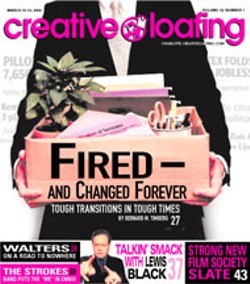In his book Transitions, William Bridges describes this change as a process of three overlapping stages: an ending, a "neutral zone," and a new beginning.
The ending -- losing one's job -- is hard enough, but most people are even less prepared for the neutral zone, where they feel a need to move on but can't make it happen. It's like a long march to a place they've never seen through a country they don't recognize. It's a time when they need all their supports, all their resources, even while they expend those resources while looking for solutions.
Interviews with four people in the Charlotte area who are in different stages of this struggle tell what it's been like in their own lives. In a city that celebrates economic success and barely acknowledges the reality of long-term unemployment, their stories say a lot about what's going on in Charlotte under the boosterism radar.
There is a learning curve in each of these people's transition, as well as much we can learn from each one's ways of renegotiating their work and life.
Judy Tooley -- The Trauma of Being "Let Go"
Judy Tooley never expected the first stage of transition -- the ending of her job -- to happen to her 12 years ago. Now in her late 50s and an avid storyteller and writer when she has time, Tooley founded her own cleaning business in Charlotte five years ago. It was in some ways a desperation move. She'd tried everything else.
When she's relaxed, Judy tells stories about her life as a Southern woman. She was a single mother, raising two daughters and working for General Electric in its Hickory, NC, plant. She supplemented her income with evening and weekend work as a bartender, but her main income was her 21-year job with GE, rising from temp work as a switchboard receptionist to becoming the administrative assistant for an engineering/marketing unit of 30 people. And one day it was over. Let's let her tell her story in her own words.
"The downsizing began in the early 1980s," Judy begins. "It got worse throughout the decade, and especially in the early 1990s after NAFTA. The general manager had left and they didn't replace him for months. Everyone was wondering what's going on. . .Then in the fall of 1992, they brought in this guy, and it was suspicious right away.
"He was always very friendly, very personable, like "Oh, I want to be your friend, I'm going to help you. . .' He reminded me of the guy in V -- did you ever see that movie? It was about these aliens but they were really reptilians and there was a food shortage on their planet. They were coming to earth to get food -- people-food.
"We knew something was going to happen. My daughters were grown and living away from home, and I had taken in a roommate who also worked at GE to share expenses. She asked her boss: "What's going to happen to me?' He just looked at her and said: "Be strong.'
"I went in to work that day -- they called it Black Friday -- dumb as a brick. I thought my seniority would take me through. One of the guys from Systems comes by. He says: I hear you're going to be laid off. He walks off and about that time my phone rings. And it's the manager. I see it and I almost didn't pick it up because I know what it is now, he's going to downsize -- terminate -- me, whatever you want to call it.
"I pick up the phone, and he's like: "See you for a minute?' And I knew. I knew. . . And so I'm walking down -- and everybody knows! Everybody's hanging over their cubicle and I'm walking, I'm walking, and everybody's like, "Hang in there, Judy, you can do it, we're with ya!' And I'm thinking, all I need is two guards and a priest.
"Once I get there we go in his office and he closes the door. They're sorry but due to less orders, cutbacks -- all this stuff -- my services are no longer needed. I wasn't going to cry.
Latest in Cover
More by Bernard M. Timberg
-

Live From Baghdad
May 14, 2003 - More »
Calendar
-

Queen Charlotte Fair @ Route 29 Pavilion
-

NEW WINDOW GALLERY-Pat Rhea-ACRYLIC PAINTINGS-April 05-30 2024 VALDESE, NC 28690 @ New Window Gallery/Play It Again Records
- Through April 30, 12 p.m.
-

TheDiscountCodes
-

"Blood Residue Analysis of Paleoamerican Stone Tools in the Carolinas" @ Native American Studies Center
- Fri., April 26, 12-1 p.m.
-

Brightfire Music and Arts Festival @ GreenLife Family Farms
-
5 Online Player Communities to Join in Michigan
-
A beginners guide to online sports betting in the US
-
I Changed my Sex. Now What?
Scott Turner Schofield's rapid transit to a new identity










